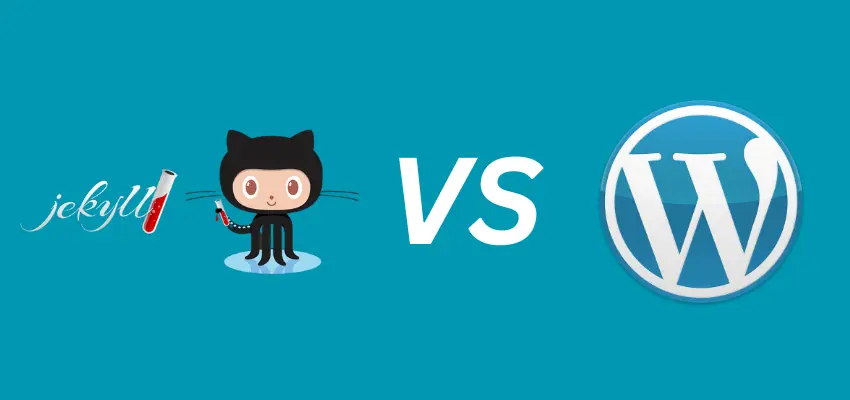Jekyll vs WordPress remains a topic unknown to most people but should be known for blogging platform selection. Blogging requires the selection of the appropriate platform at this current dynamic stage because it determines both user experience and achievement levels. Among the widely used platform selections Jekyll and WordPress stand ahead as top choices because of their distinct characteristics and beneficial aspects. We will thoroughly explore the advantages and limitations of Jekyll alongside WordPress to assist your decision-making process for starting a blog. See More blog
Table of Contents
Why Do We Need Comparison of Jekyll vs WordPress?
This article starts by examining the basic issue before comparing Jekyll vs WordPress. A proper blogging platform selection stands as a fundamental requirement for any blogger. Your online success depends on what you establish as the base of your digital presence. The platform you utilize for blogging establishes the platform for your UX system and determines website speed while dictating growth capabilities. A wrong platform selection will lead to audience dissatisfaction and restricted modification options while blocking smooth communication with your followers. Recognizing and defining the issue stands as the essential beginning for attaining success in blogging activity. how to see about Jekyll vs WordPress?
We need to mark this main issue so we can create an oath for our audience. This article wants to show you the process of comparing Jekyll with WordPress while teaching you step by step how to select your priority. Our goal is to deliver quality information that resolves your issues if you are an advanced blogger changing platforms and to new bloggers looking for initial direction. The subsequent portion reveals crucial elements and a guide to locating a platform which suits your personal blog objectives. This information helps identify Jekyll vs WordPress as your platform.

What is Jekyll?
Jekyll stands out as a fast static site generator which offers simple operation. Through its functionality Jekyll converts basic text into static webpages which deliver both improved loading performance and strengthened security features. Jekyll provides an operational system without database functionality which attracts users requiring straightforward and quick web development solutions. For blogging performance at its best you should choose Jekyll since its static character works well for the blog-oriented user base.
Advantages of Jekyll
Jekyll generates static sites at high speeds which leads to faster page loads thus improving user experience and better search engine positions.
The static nature of Jekyll allows it to work harmoniously with Git systems and Git provides a tool set to track and handle modifications to your blog content.
Simplicity in hosting applies to Jekyll sites because users can choose between GitHub Pages and other hosting options which gives users easy deployment management capabilities for their pages.
Security improves since Jekyll eliminates database management requirements and server-scripting contents which minimizes the attacks on your blog.
Jekyll provides content versioning abilities through its Markdown functions which simplify version control operations.
The minimal resource requirements for hosting static sites lead to decreased expenses for hosting compared to those needed for dynamic CMS platforms which results in lower costs. Jekyll vs WordPress
The plain text file format used by Jekyll allows effortless movement of content between different hosting systems because of its easy portability.
Jekyll wins the approval of developers because it offers easy code management through their selected editors and version control tools.
Users can create content together using Git because of its integrated support which enables team collaboration through branching features and pull request functionality. Jekyll vs WordPress
Jekyll relies on Markdown as its content creation tool because it enables developers to work with an easy-to-learn lightweight markup language that many users choose.
Disadvantages of Jekyll
Beginners who do not know command-line interfaces will typically find Jekyll’s learning process challenging. Jekyll vs WordPress
Advanced features from dynamic CMS platforms prove increasingly difficult to achieve in Jekyll because of its limited functionality capabilities.
Implementation of external service dependence creates setup difficulties when using certain features which need third-party integrations such as comments or search functionality.
Jekyll provides fewer plugins than WordPress which restricts users from accessing pre-built solutions for particular features.
Dynamic content development and creation of interactive elements within Jekyll presents various obstacles which force users to implement complex workarounds leading to degraded user interaction. Jekyll vs WordPress
Large content file management becomes tedious when done manually because Jekyll lacks an automated content management system.
Standard maintenance and plugin updates for Jekyll systems demand direct human interaction because they exceed the automatic update capabilities of many CMS platforms.
Because Jekyll maintains a smaller user base than WordPress it typically provides limited support through its smaller community network.
Jekyll provides fewer theme possibilities than WordPress does because it maintains a restricted range of available themes.
Jekyll provides decent scalability features for websites of small to medium size however it faces difficulties when used to manage expansive and sophisticated sites.
What is WordPress?
WordPress, a dynamic content management system (CMS), powers a significant portion of the internet. The programming interface of WordPress impresses users because it combines a comfortable navigation system with an extensive collection of plugins that enable websites to surpass blog capabilities. The combination of intuitive dynamic content abilities and extensive customization and solid community backing makes WordPress excel as a versatile and scalable platform for bloggers both novices and professional developers need in their projects.
Advantages of WordPress
A list of the ten primary benefits which WordPress provides follows below.
An intuitive user-friendly interface of WordPress enables beginners to access the system effortlessly while requiring little training.
Users benefit from WordPress as it presents a massive plugin ecosystem which allows them to add different functionality through plugins without writing code. Jekyll vs WordPress
A dynamic content type selection feature in WordPress operates beyond regular blogging so developers can make websites from e-commerce to portfolios.
Running on WordPress brings the advantage of its broad user community which pools together to provide plugin development alongside theme creation alongside solution-based troubleshooting features.
The integrated content management system available in WordPress makes it easy for users to manage content from creation through organization to publication to deliver superior editorial functions. Jekyll vs WordPress
Search engine optimization (SEO) remains accessible within WordPress because the platform features various SEO plugins as well as optimization tools for improving search rankings.
Content designers benefit from the easy combination of multimedia assets including pictures videos and sound files to create interactive and adaptable versions of their work.
The WordPress Customizer functions together with an array of themes to permit users to develop original websites with elegant visual design.
WordPress gives users exceptional management of roles and permissions to enable collaborative content development while still protecting website security. Jekyll vs WordPress
The system enables smooth growth which makes WordPress useful for beginners through professionals maintaining blogs of any size or high-volume websites.
Disadvantages of WordPress
Security vulnerabilities target WordPress due to its status as the most popular CMS software on the market. The security of WordPress depends on immediate safety protocols and ongoing system updates while using dependable hosting platforms. Jekyll vs WordPress
Various performance issues stem from the numerous plugins leading website owners to undertake optimization efforts to prevent sluggish site loading.
Они who learn WordPress basics easily will discover that mastering advanced features with customization needs additional time to master.
The excessive usage of plugins for website functionalities creates dependency issues since plugins frequently encounter compatibility problems during periods of minimal maintenance. Jekyll vs WordPress
Deeply customized themes have the drawback of becoming complicated due to their advanced customization features which makes their maintenance and troubleshooting more challenging.
Users who select premium themes or plugins must anticipate that the additional advanced features will increase their total costs.
The standard WordPress installation includes too many unneeded features which create an impression of program size expansion.
Users must spend additional time resolving formatting problems that occur when they change themes because of theme dependency. Jekyll vs WordPress
Database complexity increases because WordPress depends intensively on databases and large database systems demand extra work to optimize peak performance levels.
Users must proactively handle regular updates for WordPress core together with themes and plugins since these activities increase overhead due to security needs. Jekyll vs WordPress
Comparison Table of Jekyll vs WordPress:
| Feature | Jekyll (Static Site Generator) | WordPress (CMS) |
|---|---|---|
| Page Speed | Extremely fast (static files) | Slower load times occur when the site executes database queries together with plugins. |
| SEO Plugin Support | Users need to establish manual SEO configuration with both YAML files and meta tags. | The two popular SEO plugins are Yoast together with Rank Math. |
| Customization for SEO | Full control over metadata, clean HTML | Plugin-dependent, but flexible |
| Mobile-Friendliness | Fully responsive, lightweight themes | Dependent on theme choice |
| Security | Very secure (no database, no login vulnerabilities) | Upgrades must be performed on schedule because failure to do so results in attacks against this system |
| Sitemap & Robots.txt | Manual setup or plugins like Jekyll-Sitemap | Auto-generated via SEO plugins |
| Structured Data (Schema Markup) | Requires manual integration | Plugins simplify schema implementation |
| Canonical Tags | Requires manual addition | Managed by plugins |
| Duplicate Content Handling | Since there is no dynamic content (pages stay unique and undisputed) | Plugins needed to handle duplicates |
| Indexing & Crawlability | Faster indexing due to static nature | Properly optimized with plugins |
| Content Management | Markdown-based, developer-friendly | User-friendly editor (Gutenberg, Classic) |
| Dynamic Content | Not natively supported (needs API or JS) | Fully dynamic with built-in database |
| Hosting & Performance | Optimized for speed (CDN-friendly) | Hosting speed depends on provider |
| Backlink Management | Manual handling | The installation of SEO plugins enables users to manage redirection processes while fixing broken links in their websites. |
| Scalability for SEO | Scales well for simple sites | The system demonstrates good scalability potential when combined with cache technology along with optimizations. |
| Prices | Free | Free |
Which is Better for SEO?
- Jekyll provides better speed along with top security as well as technical SEO functionality at the cost of manual SEO configuration. Jekyll vs WordPress
- Users find WordPress more convenient than Jekyll due to its plugins and easy content management features yet the website speed requires optimization for competition. Jekyll vs WordPress
To Sum Up:
In conclusion, the choice between Jekyll vs WordPress hinges on your specific needs, technical proficiency, and future aspirations for your blog. Your search for the optimal blogging platform will succeed after evaluating the distinct advantages and limitations of each platform to find the one that matches your goals. Both Jekyll vs WordPress require ongoing optimization and platform understanding to reach successful blogging outcomes according to your selected platform.

